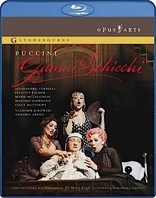
Puccini/Rachmaninov: Gianni Schicchi Blu-ray Review
Reviewed by Dr. Svet Atanasov, October 26, 2008
An opera in one act Puccini’s Gianni Schicchi was composed to an Italian libretto by Giovacchino Forzano and based on an episode (Canto xxx, 1.32) in Dante’s Inferno. It was first performed at the Metropolitan, New York, in 1918.
The second opera included on this disc, Rachmaninov’s The Miserly Knight was composed to a libretto by the composer himself after one of the "Little Tragedies" by Alexander Pushkin. It was first performed at the Bolshoi Theatre, Moscow in 1906.
Gianni Schicchi
Buoso Donati, a rich connoisseur, has passed away. He is in his bed surrounded by his relatives. Everyone is concerned by the rumor that Buoso has left his fortune to a local monastery. Hoping that the rumor is wrong the relatives begin a search for the will.
Rinnucio finds it. He announces that he will release it only if he is allowed by the others to marry Lauretta, the daughter of the famous scoundrel Gianni Schicchi. Eager to see the will the relatives agree. But after the will is read everyone's worst nightmare becomes a reality - Buoso Donati has left his fortune to the local friars.
Rinnucio suggests that the relatives seek the help of Schicchi. Some are unsure, others agree. Finally, the relatives agree but stress that without an inheritance the marriage between Rinnucio and Lauretta would be impossible.
Suddenly Schicchi enters. After a short discussion everyone agrees on a massive scam where Schicchi will take the place of the late Buoso and dictate a new, more satisfying, will to his lawyer.
The doctor arrives. He is quickly convinced that Buoso is still alive and well. Then the family lawyer appears and Schicchi announces that he wishes to alter his will. He begins to dictate and much to the dismay of the relatives leaves Buoso’s fortune to himself. After the lawyer leaves the angry relatives begin to tear the house down. Schicchi drives them away. Rinnucio and Lauretta will soon marry. Schicchi turns to the audience and asks for forgiveness citing that the happy-ending justifies the means.
01 - Allegro
02 - No. Non e!
03 - Dunque era vero!
04 - E non c´e nessun mezzo...
05 - Firenze e come un albero fiorito
06 - O mio babbino caro
07 - Era eguale la voce?
08 - Addio, Firenze
09 - Ecceo il notaro!
10 - Ah! che uomo
11 - Curtain calls and credits
 淘宝店铺:http://94hd.taobao.com
淘宝店铺:http://94hd.taobao.com